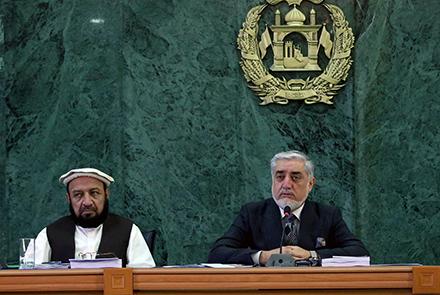CEO Abdullah Abdullah said on Monday at the Council of Ministers meeting that there was concern over the closure of electoral commission offices in a number of provinces.
Abdullah said that closing of electoral offices will not help with transparency in the elections.
“At the moment we are all trying to improve the election process and besides all other existing problems the closure of electoral offices in the provinces under any name is not helping with election transparency,” said CEO Abdullah Abdullah.
He also said that the Election Commission is responsible for the continuation of discussions with parties and civil society organizations to ensure transparency.
President Ashraf Ghani said a while back that the main demand of the parties was the use of technology in elections – an issue that has now been addressed.
“The main issues of discussion was the use of a biometric system which has already resulted in steps being taken; but if there are any considerations in the future regarding the implementation it is understandable and can be discussed,” said Abdullah.
This comes after Gulajan Abdulbadi Sayyad head of the Independent Election Commission (IEC) on Sunday criticized political parties for closing IEC offices in parts of the country.
Sayyad called on the coalition of political parties to stop closing the offices and to instead share their list of demands with the commission so that a legal solution can be sought.
Speaking at a press conference in Kabul, Sayyad said political parties and observer institutions are not attending IEC meetings nor are they cooperating with the commission – yet they constantly level criticism at the IEC.
“The culture of closing offices must end, and those who are closing offices in the centers and then in the provinces will be responsible for delaying the elections, they do not want to hold elections on time,” said Gulajan Abdulbadi Sayyad IEC chief.
“We request all of them to share their legal demands in the framework of the law with the commission and to find a legal solution for their concerns regarding the transparency of the elections,” Sayyad added.
The IEC chief said that in the event of the elections being delayed the commission will not be responsible.
Earlier a number of major political parties closed the offices of the Independent Election Commission (IEC) in Balkh, Kandahar and Herat provinces on Saturday over demands for a transparent election and a change in the electoral system.
The political parties that operate under the Grand National Coalition have threatened to also close IEC offices in Nangarhar, Kunduz, Bamiyan, Panjsher, Faryab and Jawzjan provinces if their demands are not met.
Meanwhile, the CEO said that that those who are questioning the Bilateral Security Agreement (BSA), approved by the Loya Jirga, need to refrain from doing so.
This comes after a number of members of Wolesi Jirga (the Lower House of Parliament) during Saturday’s session opposed calls by fellow parliament members for a review of the BSA signed between Kabul and Washington.
In the wake of a sharp increase in fatalities among security forces in numerous provinces, MPs on Wednesday called for the BSA to be reviewed. They said the agreement has not been successful in the fight against insurgency.
These MPs also said that the US has failed to enforce the agreement when it comes to the mobilization of Afghan Security and Defense Forces (ANDSF).
From among 150 MPs present at the session on Wednesday, 146 voted in favor of the move.
“Any contract that has no adaptive aspect can be terminated in its nature. Therefore it is reversible and the parliament must take a decision about this security pact in line with the interests of the country,” said one MP Mohammad Sarwar Osmani on Wednesday.
On Saturday, however, some MPs opposed the move and said the cancelation of the BSA would be detrimental to the country but in favor of Pakistan.
The Bilateral Security Agreement was signed in 2014 before the drawdown of US troops in the country.
It set out numerous conditions including the troop strength and conditions for the Resolute Support mission in the country. In accordance with the BSA, the US also pays the salaries of all Afghan National Defense and Security Force members.
The agreement was signed between Kabul and Washington after the National Unity Government came into power.

